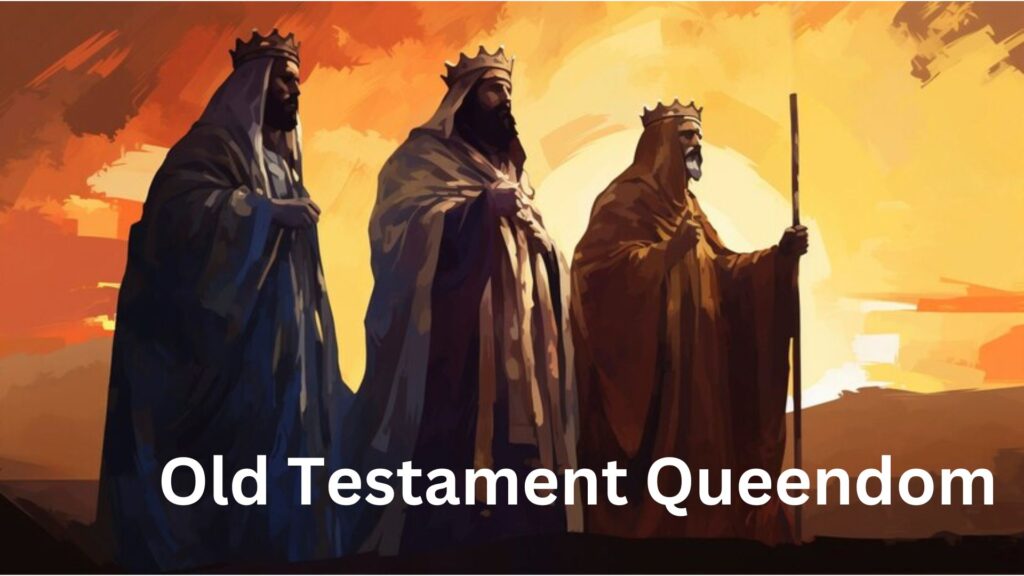The Old Testament, a cornerstone of Judeo-Christian traditions, is often viewed through the lens of patriarchal narratives. However, a closer examination reveals that women held significant power and influence in the social, political, and spiritual realms. While the term “queendom” might not be explicitly used, the Old Testament presents several stories where women acted with authority and exercised leadership, effectively shaping the course of Israel’s history. This article delves into the concept of “queendom” in the Old Testament, exploring the roles, responsibilities, and impact of women in ancient Israel.
The Role of Women in the Old Testament
Women as Matriarchs
In the patriarchal society of ancient Israel, women were primarily seen as bearers of children and keepers of the household. Yet, several women rose to prominence as matriarchs, whose decisions and actions had far-reaching consequences. Sarah, Rebekah, Rachel, and Leah are central figures in the Genesis narratives. These women, through their influence on their husbands and children, played pivotal roles in the formation of the Israelite nation. Their decisions, from Sarah’s insistence on Isaac’s inheritance to Rebekah’s role in Jacob’s blessing, demonstrate their subtle yet powerful influence.
Women as Prophets and Judges
Beyond their roles as mothers and wives, some women in the Old Testament held positions of religious and political authority. Deborah, one of the most prominent figures, served as a judge and prophetess in Israel during a time of crisis. Her story, recounted in the Book of Judges, highlights her leadership in rallying the tribes of Israel against the Canaanite oppression. Deborah’s military and spiritual leadership exemplifies the idea of a “queendom” within a patriarchal society, as she commanded respect and obedience from both men and women.
Similarly, Miriam, the sister of Moses and Aaron, is recognized as a prophetess. She played a significant role during the Exodus, leading the women in song and dance after the crossing of the Red Sea. Miriam’s leadership and prophetic voice underscore the spiritual authority that women could wield in ancient Israel.
The Concept of Queendom in the Old Testament
Queens and Female Rulers
While the Old Testament is primarily focused on kings, there are instances where queens and female rulers exerted considerable influence. The Queen of Sheba, for example, is a figure shrouded in mystery and legend. Her visit to King Solomon, as described in 1 Kings 10, highlights her wealth, wisdom, and political acumen. Although she is a foreign queen, her interaction with Solomon underscores the power and diplomacy that women could possess.
Another significant figure is Jezebel, the wife of King Ahab of Israel. Though often portrayed as a villain due to her promotion of Baal worship, Jezebel’s story also reflects the political power that a queen could hold. Her influence over Ahab and her active participation in state affairs demonstrate that women in the Old Testament could wield substantial authority, even if their actions were ultimately condemned by the biblical writers.
The Influence of Royal Women
The Old Testament also records the influence of royal women who, while not ruling in their own right, played crucial roles in the governance and direction of the nation. Bathsheba, the wife of King David and mother of Solomon, is one such example. Her intervention secured Solomon’s succession to the throne, highlighting her political savvy and the behind-the-scenes power women could exert.
Similarly, the story of Esther, while set in the Persian Empire rather than Israel, illustrates the potential for a woman to change the course of history. As queen, Esther used her position to save the Jewish people from extermination, demonstrating courage, intelligence, and strategic thinking. Esther’s queendom is marked by her ability to navigate a male-dominated world to achieve a significant victory for her people.
Theological Implications of Queendom
God’s Use of Women in Leadership
The recurring theme of women in positions of influence and authority in the Old Testament suggests a broader theological point: God’s willingness to use women as leaders and agents of His will. This challenges the traditional view of a purely patriarchal biblical narrative. The stories of Deborah, Esther, and others show that God entrusted women with significant responsibilities, often in times of national crisis or spiritual renewal.
The Symbolism of Wisdom and Femininity
In the wisdom literature of the Old Testament, femininity is often symbolically linked with wisdom. Proverbs personifies wisdom as a woman, highlighting the value and importance of female attributes in the divine order. This symbolic association further emphasizes the potential for women to embody and exercise leadership, wisdom. And influence within the spiritual and societal structures of ancient Israel.
Conclusion
The concept of “queendom” in the Old Testament, while not explicitly named. Is evident in the stories of powerful, influential women who shaped the course of Israel’s history. From matriarchs like Sarah and Rebekah to leaders like Deborah and Esther, the Old Testament presents a nuanced view of women’s roles. These women, through their wisdom, courage, and faith, exerted a form of leadership that. While often overshadowed by male figures, was nonetheless crucial to the development and preservation of the Israelite nation.
ALSO READ:The Mystical World of Hurbarna: A Journey Through History, Culture, and Nature
FAQs
What is meant by “Old Testament Queendom”?
“Old Testament Queendom” refers to the influence, power, and leadership exercised by women in the Old Testament. While the term “queendom” is not used in the Bible. It encapsulates the significant roles that women played in shaping the history and faith of ancient Israel.
Who are some key female figures in the Old Testament?
Key female figures include Sarah, Rebekah, Rachel, Leah, Deborah, Miriam, Bathsheba, Jezebel, and Esther. These women held positions of influence as matriarchs, prophets, queens, and leaders.
Was there ever a female king in Israel?
The Old Testament does not record any female kings ruling Israel. However, women like Deborah served as judges, and others like Jezebel and Athaliah wielded significant political power as queens. Though their stories are often marked by controversy.
What role did the Queen of Sheba play in the Old Testament?
The Queen of Sheba, a foreign monarch, visited King Solomon to test his wisdom. Her story, found in 1 Kings 10, highlights her diplomatic skills and the respect she commanded. Symbolizing the power and influence that a queen could hold.
How does the Old Testament view women in leadership?
While the Old Testament is largely patriarchal, it also acknowledges and records the significant contributions of women in leadership roles. God’s use of women like Deborah, Esther, and others demonstrates that female leadership was not only possible but also divinely sanctioned at critical moments in Israel’s history.







